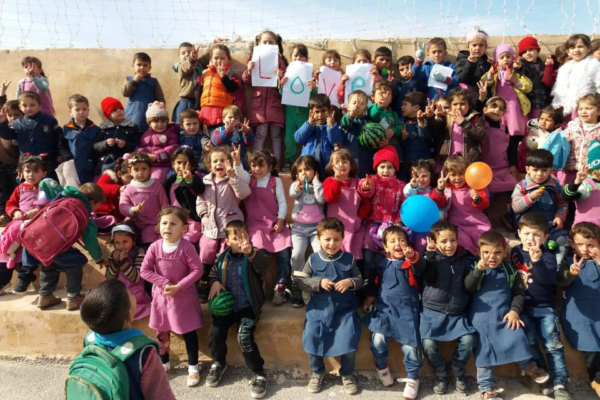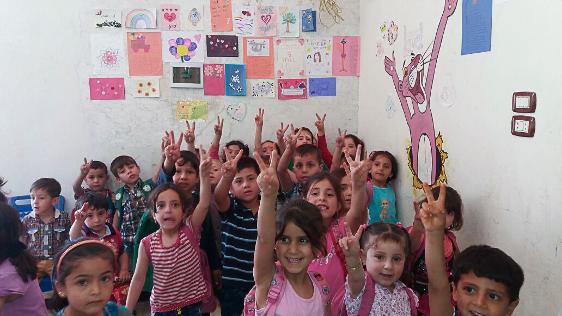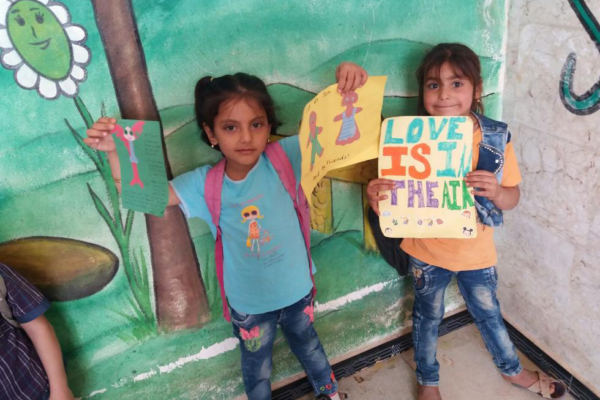Arkansas Episcopalians rally support for Syrian school while raising awareness of refugee crisisPosted May 7, 2019 |
|

The Wisdom House Project is a partnership between the Syrian Emergency Task Force and an ecumenical group that originated at St. Peter’s Episcopal Church in Conway, Arkansas, to support a makeshift school for kindergarteners in Syria’s Idlib province. The school teaches about 130 students a year. Photo: Wisdom House Project, via Facebook
[Episcopal News Service] If you haven’t thought much about the Syrian refugee crisis lately and want an update, consider asking an Episcopalian from Arkansas.
You might learn that the Syrian province of Idlib is the last stronghold of rebels fighting the government forces of President Bashar al-Assad, and humanitarian activists warn a final showdown in Idlib could create an “apocalyptic scenario” for civilians, many of them refugees displaced from their homes by Syria’s eight-year civil war.
Idlib also is home to the Wisdom House Project, a school for kindergarteners that recently graduated its third class. Those students are the ones with a connection to Arkansas, through an ecumenical partnership with roots at St. Peter’s Episcopal Church in Conway, Arkansas.
With the ministry’s help, life in Idlib carries on in the face of ever-present danger.
“Right now, our biggest concern is the well-being of our students, teachers and their families and figuring out, first of all, how to keep the school going,” the Rev. Teri Daily said in an interview with Episcopal News Service. “And if there comes a time when that isn’t possible, how do we help our families that are on the ground there?”
The Syrian boys and girls who attend Wisdom House Project have become “our students” and “our families” for many Arkansas Episcopalians because of the Wisdom House Working Group, which Daily helped launch in Conway in 2016, while she was rector at St. Peter’s. Since then, the group has raised about $100,000 for the Syrian Emergency Task Force, a nonprofit that has used the money to renovate classrooms in Idlib, outfit them with desks and teaching materials, pay teacher salaries and even buy a school bus.
The school now has five teachers and four staff members, who take the photos and videos that fill the Wisdom House Project’s website and social media feeds with the faces of smiling young children.

Money raised since 2016 through the Wisdom House Working Group in Arkansas has helped the Syrian Emergency Task Force renovate classroom space for five teachers and their students in Idlib, Syria. Photo: Wisdom House Project
In the photos, the children raise their hands in celebration. They show off their latest craft projects. They stand proudly in front of classroom artwork. They wear hand-sewn uniforms, which were funded by American donations, as were the backpacks draped over their little shoulders. And they hold up colorful letters of hope and encouragement created for them in Arkansas by children they’ve never met.
But this ministry isn’t limited to a narrow focus on the education of 130 or so students in one Syrian community. It also hopes to raise awareness in the United States about the bigger picture in Syria, a country where hundreds of thousands have been killed in a seemingly intractable internal conflict. That conflict in recent years has been overshadowed globally by the parallel, but separate, fight in Syria against the terrorist group ISIS.
“The word needs to get out about what is happening and how this country is being devastated,” said Jerry Adams, a St. Peter’s parishioner who serves as chair of the Wisdom House Working Group. “The bigger picture is there’s no easy way out for this country.”
Assad began his brutal crackdown against a pro-democracy rebellion in 2011, sparking what the United Nations High Commissioner for Refugees, or UNHCR, calls “the biggest humanitarian and refugee crisis of our time.” An estimated 5.6 million people have fled Syria since the civil war began, most of them to Turkey.
In September 2015, global attention to the plight of Syrian refugees intensified in response to photos of a dead 2-year-old Syrian boy lying facedown on a beach after a boat capsized while his family was trying to flee the war-torn country.
“The international news was plastered with the refugee crisis, of refugees coming out of Syria,” Daily said. “The situation was really dire, and violence was escalating.”
At the same time, some Republican politicians, citing potential terrorist threats, were voicing opposition to resettling Syrian refugees in the United States. President Donald Trump, then a presidential candidate, vowed in December 2015 to implement “a total and complete shutdown of Muslims entering the United States.”
The Episcopal Church also took a public stance that year, when its General Convention voted in July 2015 on a resolution denouncing “the slaughter and displacement of Syrians” and urging congregations to pray “for an end to the humanitarian and refugee crisis in Syria.”
One Sunday that fall, Daily raised the issue in an announcement to her congregation. “I put out a call and said, ‘The refugee crisis that’s taking place in Syria is weighing heavy on my heart, and if it’s weighing heavy on your heart, meet me in the library at 3 o’clock.’”
Somewhat to her surprise, more than a dozen parishioners joined her that afternoon, and they began their first conversation about what one Episcopal congregation in Arkansas could do.
They started by learning more about the Syrian conflict and listening to the stories of Muslims originally from the Middle East who had moved to Arkansas. They looked into sponsoring a Syrian refugee family but found that few were being resettled locally. And they initially struggled to find ways of supporting humanitarian outreach in Syria.
Then in March 2016, Mouaz Moustafa, executive director of the Syrian Emergency Task Force, came to Conway to speak at a TEDx conference hosted by his alma mater, the University of Central Arkansas. The group from St. Peter’s reached out to him by phone, and the morning after his speech, he met over coffee with Daily, Daily’s husband and Adams to talk about Moustafa’s native Syria.
“We said, ‘We don’t know how to help,’” Daily recalled. “And Mouaz said, ‘You know, there are so many more displaced people living within Syria than there are refugees who have left Syria.” The UNHCR estimates about 6.6 million Syrians are considered internally displaced, or refugees in their own country.
The Syrian Emergency Task Force had not yet gotten involved in humanitarian work, focusing instead on advocacy in Washington, but Moustafa knew of some Syrian women in Idlib who had begun teaching refugee children and orphans at a makeshift school. After several months of planning and conversation, the nonprofit and the Episcopal congregation agreed to work together in support of the Idlib teachers. St. Peter’s made its first donation to the cause in August 2016, and the next month it officially kicked off the Wisdom House Working Group, committing to at least five years.
https://twitter.com/WisdomHseSyria/status/1125449070212988929
“Since then, Episcopal churches have been really amazing,” said Natalie Larrison, Syrian Emergency Task Force’s director of outreach. Larrison, who is based in Arkansas, joined the nonprofit the same year that it formed its partnership with St. Peter’s, and she is its primarily liaison with the Wisdom House school.
One of the first improvements the project made was to find an underground location for the school, essentially the basement of an existing building, which provided increased security for students. The children are all 6 or younger, so they were born after the start of the Syrian conflict.
“They’ve only known war,” Larrison said.

Students at Wisdom House in Idlib, Syria, hold up some of the “Letters of Hope” they received from children in Arkansas. Photo: Wisdom House Project
The Wisdom House Working Group has grown to include representatives from other churches in and around Conway. About 10 or more of them meet regularly in person or by conference call to get updates on the needs at the school in Idlib and to plan fundraisers.
Today, despite a truce last September, violence is on the rise again in Idlib, putting the nearly 3 million people living in the province under constant threat of attack. Adams expressed frustration that the urgency of the crisis doesn’t resonate with more Americans.
“It’s easy to block it out. It’s not next door. It’s Muslims, not Christians,” Adams said. “If your children hear a plane, they think it’s a passenger plane. If you’re in Syria, the kids think they’re being bombed.”
Daily left St. Peter’s in 2017 to serve as rector of All Saints’ Episcopal Church in Russellville, about 75 miles away from Conway, but she remains involved in the Wisdom House Project. Like Adams, she hopes their work will encourage Americans to pay more attention to Syria.
The project also conveys to Syrians the message that they haven’t been forgotten. That is the purpose of “Letters of Hope,” the letter-writing campaign involving Arkansas children. In photos from Idlib, Daily said she is heartened “to see the faces of the children at the school when they get letters from other children, and to see the faces of the teachers when they feel like they’re not totally alone there.”
– David Paulsen is an editor and reporter for the Episcopal News Service. He can be reached at dpaulsen@episcopalchurch.org.

Social Menu